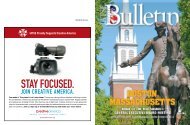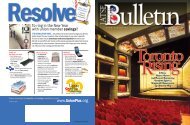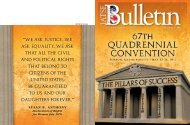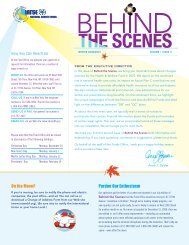Labor Education Assistance Program - IATSE Local 8 Philadelphia
Labor Education Assistance Program - IATSE Local 8 Philadelphia
Labor Education Assistance Program - IATSE Local 8 Philadelphia
Create successful ePaper yourself
Turn your PDF publications into a flip-book with our unique Google optimized e-Paper software.
By David Geffner<br />
I caught up with Lauren Selman, 23, founder and CEO<br />
of Reel Green Media, on her cell phone as she was<br />
hurrying to a warehouse in downtown Los Angeles.<br />
Selman’s three-year old company helps integrate<br />
environmentally sustainable practices into the film<br />
and television industry, but on this day Selman was<br />
working with another L.A.-based greening firm,<br />
EcoSet Consulting, whose just-wrapped commercial<br />
client needed Selman’s expertise.<br />
18 Official Bulletin<br />
“The producers said sixty boxes, packed with<br />
props and set dressing, had to be redistributed by 5<br />
P.M. tomorrow or they will end up at the dump,”<br />
she explains breathlessly. “I’ve spent the day calling<br />
all our non-profit partners to arrange for a coordinated<br />
donation at the storage facility in the morning.<br />
In the green world that’s a win-win: EcoSet’s<br />
commercial client doesn’t have to pay for disposal,<br />
and they get a dollar-for-dollar tax write-off for the<br />
charitable donations!”<br />
Victories against the tidal wave of waste and emissions<br />
humanity has rained down on the earth are<br />
what a new breed of eco-proponents like Selman is all<br />
about. And nowhere are her services more essential<br />
than in entertainment, an industry struggling to<br />
reduce its massive carbon footprint. Not that Hollywood<br />
hasn’t “seen green” before; according to Selman,<br />
a former UC Berkeley theatre major, environmental<br />
practices in the film and television business have been<br />
around for several decades thanks to a dedicated core<br />
of below-the-line craftsmen and women.<br />
“The foundation for starting Reel Green Media<br />
came through my conversations with crew-members<br />
who felt the above-the-line community was not supporting<br />
their efforts,” Selman recalls. “I call these people<br />
‘eco-champions’ - costume designers, scenic<br />
artists, property masters, construction coordinators,<br />
etc. - who have passionately fought for conservation<br />
on the sets where they work, often without a mandate<br />
from their employers. That’s changed in the last year<br />
with the creation of sustainability departments at the<br />
major studios. But ‘seeing green’ will always begin<br />
with the crews on the ground - the eco-warriors<br />
intent on making a difference.”<br />
CLEANING UP<br />
The Alliance is filled with brigades of such greeneyed<br />
soldiers, as well as like-minded employers<br />
helping to facilitate sustainability efforts. In some<br />
cases, like on the east and west coasts of Canada, IA<br />
locals are part of broad industry partnerships that<br />
share green information and practices. In other<br />
examples, like with San Francisco’s theatrical<br />
wardrobe workers, safety concerns have driven the<br />
move toward an eco-friendly workplace. <strong>Local</strong> 784<br />
secretary-treasurer Andrea Pelous says Bay Area costumers<br />
were among the first to stop using dangerous<br />
chlorinated hydro carbons (found in dry cleaning<br />
chemicals like picrin), dating back to 1995, when the<br />
IA Wardrobe <strong>Local</strong> introduced a list of non-toxic<br />
cleaning alternatives for their members. “Three<br />
years ago we started a standing health and safety<br />
committee to maintain and update MSDS’s (material<br />
safety data sheets),” Pelous says. “I’ve also been<br />
adding green information to our newsletters, like a<br />
list of Bay Area dry cleaners that use environmentally<br />
friendly cleaning techniques – silicone-based solvents,<br />
liquid CO2 and water – none of which are<br />
petroleum based.”<br />
Pelous is equally green off-stage, keeping no<br />
chemicals in the home where she lives with her 7<br />
and 9-year old daughters - the family of three is so<br />
waste-conscious they produce only one bag of<br />
garbage per month! “We’ve had Monona Rossol<br />
[President/founder of Arts, Crafts and Theater Safety,<br />
Inc., and the Health and Safety Director for <strong>Local</strong> 829<br />
United Scenic Artists], who is an industrial hygienist<br />
and grew up in the theater, speak to our members<br />
about chemical safety in the workplace,” Pelous continues.<br />
“Monona’s book, Stage Fright [Allworth Press,<br />
1986] was the first-ever book devoted just to the<br />
health and safety hazards faced by theater workers.<br />
Here in San Francisco, being safe and being green<br />
have always gone hand-in-hand.”<br />
<strong>Local</strong> 784 wardrobe head Geoffry Craig agrees,<br />
saying his workplace – the San Francisco Opera - is<br />
safer because it’s greener. “Our costume shop and<br />
wardrobe organized their safety committees in<br />
1991,” Craig explains, “and in order to comply with<br />
California state law, safe work practices and procedures<br />
were implemented. We maintain a library of<br />
Fourth Quarter 2009 19

















